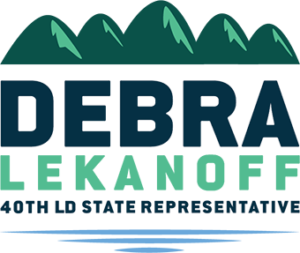Working for Future Generations on Fantastic Friday!
Dear Friends,
WWU has been working for nearly a decade on a Coast Salish-style longhouse following a request from Indigenous students who wants a cultural center on campus and a meeting place for the Native American Student Union.
Now, I am pleased to report that construction is set to start!
The Longhouse will be built on the ancestral lands of the Lummi Nation and Nooksack Tribe, and it has been designed in collaboration with these two tribes and with the input of WWU students. The Longhouse will be a place where students can learn about Native American culture and history, and it will also be a place where students can come together to build community and understanding.

There will be an invitation-only ground turning and blessing ceremony on April 11 as construction begins on the longhouse in the Sehome Hill Arboretum.
The Bellingham City Council is holding a public hearing on the proposed 75-year lease for the land on April 8, and it is my hope that this longhouse will be a part of the WWU community for generations to come!
“The core purpose, and you’ll see that in the lease agreement, is for tribal activities, education, ceremonies,” Parks and Recreation Department Director Nicole Oliver said. “It’s going to be the office of the Tribal Liaison at Western. It will have student areas as well as a central area for meetings and ceremonies, classes and the like.”
Read more about the project here.
Be sure to check back in periodically on updates – it will be some time as construction is just beginning, but I cannot wait for the grand opening!
Keep reading for more on this Fantastic Friday.
Rep. Debra Lekanoff
Protecting Our Drinking Water
It’s no secret that I feel passionate about protecting our environment, and about protecting our health. One of the most important pieces of that is ensuring that everyone has access to clean drinking water, and protecting our waters and waterways has long been a priority of mine.
This week, I am happy to let you know about a new rule from the Environmental Protection Agency (EPA) that sets a strict limit on “forever chemicals” in our drinking water, requiring that utilities reduce them to the lowest measurable level.

According to AP News:
“The rule is the first national drinking water limit on toxic PFAS, or perfluoroalkyl and polyfluoroalkyl substances, which are widespread and long lasting in the environment.
PFAS chemicals are hazardous because they don’t degrade in the environment and are linked to health issues such as low birth weight and liver disease, along with certain cancers. The EPA estimates the rule will cost about $1.5 billion to implement each year, but doing so will prevent nearly 10,000 deaths over decades and significantly reduce serious illnesses.”
This is a tremendous and necessary step forward, and one that will have long lasting impacts as future generations are not exposed to these harmful chemicals.
We must continue to look to the future as we make today’s rules and regulations, understanding that we are doing the work today for our grandchildren, and their grandchildren.
Thank you to all of the hard workers at the EPA who made this new rule possible – you have helped so many people by ensuring they will have clean drinking water for generations to come!
Repatriating Native Artifacts
Now friends, I want to talk about something that you may have seen in the news lately.
Many museums across the country, including the American Museum of Natural History in New York City, has covered or closed exhibits that display cultural materials from people Indigenous to the Americas.
This is because of new federal regulations around the Native American Graves Protection and Repatriation Act (NAGPRA), which “has provided for the protection and return of Native American human remains, funerary objects, sacred objects, and objects of cultural patrimony.”

Unfortunately, for many years this repatriation process has been slow or nonexistent, with federal rules allowing the institutions to essentially self-govern the return of items in their possession.
According to ProPublica:
“Institutions have dismissed tribes’ oral histories and other evidence of a connection to the ancestors they sought to claim, saying that not enough information was available to conduct repatriation. In these cases, museums have declared the human remains and items “culturally unidentifiable,” which allowed them to be used for scientific research over tribes’ objections.”
Now, with these new rules, the institutions are required to defer more to the knowledge of the tribes about their regions and histories in decision making around the repatriation of these items.
This is a great step forward, and I hope to see our cultural artifacts returned to their rightful homes. It will still take a long time, and the process will be slow, but I am confident with these new rules in place we will see real progress.
Be sure to keep an eye out in future newsletters for updates on this front.
Vin Baker Recovery Center
Last year I had the honor of meeting Rise Above, a Native American non-profit organization founded by Jaci McCormack. Through her work with Rise Above, Jaci uses her experiences and story to provide guidance and tools to Native Youth by meeting them where they are in life.
She brings Youth together through their shared love of basketball, connecting them with legends such as Super Sonics Coaches Lenny Wilkens and George Carl, with players Dale Ellis, Vin Baker, and Herman. My journey in recovery to addiction began with these legends who lifted me up and believed in me, stepping alongside to walk with me during my journey.
Jaci and Vin Baker continue to be part of my journey, and this week I had the pleasure of traveling with Rise Above to Milwaukee for the opening of the Vin Baker Recovery Center. The center opened its doors as an affordable resource for people looking for help addressing substance abuse, addiction, and mental and behavioral health crisis.
Vin is a former NBA star for the Milwaukee Bucks and a current Assistant Coach with the team, announced his plans to open this affordable treatment center last year. Vin has struggled with alcohol and drugs in his life and is giving back to the community that supported him through trying times.

During my visit to the Vin Baker Recovery Center, I met with Vin Baker, Representatives Kalan Haywood, Robyn Vining, Darrin Madison, and Dora Drake, Attorney General Josh Kaul, and community members to understand their approach to combating addiction and promoting wellness. Wisconsin’s innovative model, with the creation of recovery hubs like the Vin Baker Recovery Center, serves as an inspiration for addressing addiction crises and promoting healing in communities.

Looking ahead, I am building a partnership with Vin Baker, I am committed to bringing a similar accessible treatment model to Washington to support individuals battling addiction. Collaborations with influential figures like Attorney General Josh Kaul, who played a crucial role in allocating opioid lawsuit settlement funds towards supporting recovery structures, provide valuable insights for our work in Washington and beyond.


We should all feel inspired by Vin Baker’s remarkable journey of recovery and the collaborative efforts in Wisconsin, and I am determined to work towards providing accessible healing options for individuals in need.
By joining forces and learning from successful models like those in Wisconsin, we can make meaningful strides in supporting our communities and saving lives. Together, we can make a difference in the fight against addiction.
New Fight for Reproductive Rights
Friends, it is with a heavy heart I bring you an update on reproductive rights in Arizona.
Many of you have likely seen this, but the Arizona State Supreme Court recently ruled that the state can enforce an 1864 law that bans nearly all abortions, only giving exception for the life of the mother.
The law predates Arizona’s statehood and does not provide exceptions for rape or incest. It is a terrifying thought that the reproductive rights of Arizonans are being stripped away by a law passed during the civil war, before Arizona was admitted to the Union, and before women had the right to vote.

The ban could go into effect in weeks but will likely take longer than that due to an agreement in a separate case.
This is heartbreaking for me, and we should all be outraged by this development. It is so important that we get out to the polls this November and cast our votes for the right people – the candidates who will protect your freedom of choice and stand up for reproductive rights across the country.
We will always fight for your health freedoms here in Washington State. A person’s right to choose is vitally important, and it will always be a priority of mine. As long as you keep your trust in me to represent you in Olympia, I will fight for this paramount right for all Washingtonians.
Bellingham Wastewater Treatment Plant
Finally, this week I want to close out our Fantastic Friday by letting you know about a recent notice from the Northwest Clean Air Agency.
On March 27, the Northwest Clean Air Agency issued a notice to Bellingham’s wastewater treatment plant that the incinerators they use to burn sewage violate air quality standards. The agency enforces federal, state, and local air quality regulations at stationary sources of air pollution within its jurisdiction.
The city has a 60-day to 180-day window to meet emissions limits and standards, and they are working closely with the Northwest Clean Air Agency to ensure that their operations meet necessary standards.
This is a vital service for the city of Bellingham, and one that needs to operate under the proper regulations. I have every confidence that the city government will take the necessary steps to ensure their wastewater plant meets emissions standards as soon as possible.



